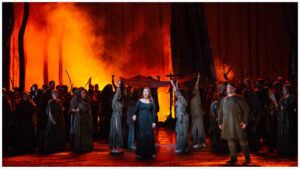
Metropolitan Opera 2022-23 Review: Norma
By Logan MartellPhoto Credit: Marty Sohl
On February 28, 2023, the Metropolitan Opera raised the curtain on this season’s run of Bellini’s “Norma,” starring Sonya Yoncheva in the title role.
Revenge is a Forest
David McVicar’s 2017 production is faithful to its source material and effective in its simplicity. The many slender trees either filled the space between the numerous warriors for choral numbers or framed the cast nicely during their more private moments, sliding in and out as necessary. This treatment played well into the allegorical sense of “the forest” as an interpersonal labyrinth, such as what the poet in Dante’s “Divine Comedy” encounters at the beginning of his journey. All characters, whether the wronged Norma, the oppressed druids, or the conquering Romans, find themselves at a junction, and it is here where the magic and dramatic power of the works unfold.
In the title role, Yoncheva’s portrayal was nothing short of sublime. Her Act one entrance seemed to build off all the musical and dramatic fervor of the earlier numbers as Yoncheva ascended the platform with a palpable air of awe and mystery before her powerful, unaccompanied lines drew all eyes and ears towards herself. Her following aria, “Casta Diva,” wove a truly tender invocation to peace, with her delivery and tempo carrying with ease that deftly bore Yoncheva’s sentiments across the broad, lyrical phrases. This display of Norma as a figurehead was wonderfully contrasted by her private cabaletta, “Ah! Bello a me ritorna,” where her truer feelings were shown with infatuated and accurate tones.
Yoncheva maintained a wellspring of vocal color and dramatic nuance throughout her long time onstage. Her Act two scene, where she contemplates murdering her children, saw her physically and mentally at her wit’s end, as seen from her hunched, almost-predatory bearing, and heard through her languid pianissimos and lyricism that seemed in dialogue with the unhinged woodwinds. Yoncheva’s battle of wills against Spyres in the final scene saw both actors play off each other to splendid results. Vocally, they were well-matched, and neither seemed to shy away from getting more physical. This chemistry was vital in their eventual union in death at the pyre, staged as a fatal yet redemptive wedding ceremony for the two.
As Pollione, Michael Spyres’ rich tenor accomplished much in fleshing out the character of the conflicted Roman proconsul. His opening lines saw the typical ardor of the love-struck tenor nicely tinged by the darker reality of his circumstances with Norma; this Pollione sounded to love no less the second time he became involved with a priestess of the druids. These extremes of love and fear are illuminated through his aria “Meco all’altar di Venere,” where his vision of Norma’s vengeance serves as a fatal prophecy for him to rebuke passionately.
His interactions with Gubanova’s Adalgisa saw the antagonistic effect of these earlier feelings as he urged her away, looming over or circling about her with hostility. After their initial quarreling, his aria, “Va crudele,” gave him a chance to present himself as a more authentic lover as they reconciled to their duet.
In the role of Adalgisa, Ekaterina Gubanova frequently captivated through her vibrant mezzo-soprano. Despite her lower fach, she excelled in the youthful aspects of the role and had no difficulty with the vocal heights and sheer passion required as Pollione’s initial advances wore on her; the way she took up his melody with yearning and hesitance said much of her growing surrender. These qualities helped reinforce the idea of Adalgisa being at the same point in her life as Norma once was, beautifully exemplified in her duet “sola, furtiva al tempio.” Gubanova’s portrayal spoke from a place of experience and a refined sense of artistry, bringing great vitality into this role.
Rounding out, the main cast was Christian Van Horn as Oroveso. This production casts the chief of the druids in a fiercer mold and plays up the warrior aspects of the part, qualities which Van Horn displayed great command of through his imposing presence and rich bass-baritone. The underlying rage of the chief could be heard as Van Horn’s phrases often bubbled like magma waiting to erupt. This authoritative air made him a resonant counter for Norma, as he well-embodied the voice of the druids desiring war and liberation and the voice of the conventions which give Norma both her power and captivity.
Young Standouts
Making their debut on the Metropolitan Opera stage was tenor Yongzhao Yu as Flavio and soprano Brittany Olivia Logan as Clotilde. As Flavio, the audience was introduced early on to Yu’s warm yet urgent tones, being the voice of reason to Spyres’ Pollione. While a supporting role, Logan’s Clotilde was sung with clarity and lovely, full-bodied tones, which did remain at the forefront of the musical texture even when interacting with Yoncheva and others.
A Sure-Fire Spell
Conductor Maurizio Benini led the orchestra to intoxicating heights through his breadth of experience. From the fatal opening chords of the overture, the music begins to lay out an extended tapestry of ideas; when taken too slowly, the spell falls apart too fast, and its impact is glossed over. Benini expertly drew the most of every moment, whether it be the enchantment of Norma’s “Casta diva” aria, the blood-pumping fervor of the warriors readying for battle, and every emotional twist in between.
Tuesday’s performance was a winning formula for an effective, authentic staging and a cast of renowned artists supported by promising new ones. While a daunting work of the bel canto repertoire, the reward when all the demanding aspects align is absolutely worth the effort and was greatly enjoyed by the full audience. This cast will perform through the remainder of the production’s run, and audiences will not want to miss the opportunity to see this treasure of a work.



